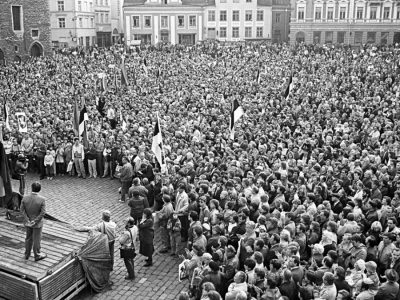As the main focus for this post, I’d like to look at a subject essay by James von Geldern on the aftermath of the Holocaust in causing division among minorities who were targeted by the Nazi Party throughout World War II. Even though the post-war climate in the Soviet Union was generally upbeat as a result of the […]![]()
Category: 7th Weekly Edition
Cowards are to be Exterminated…
by •
In 1942, the United States had hardly stepped into World War II. The Soviet Union, on the other hand, was getting beat up pretty badly by the Germans. The Nazis were moving hard and fast through Russia, pushing the Red Army further and further back. But one battle showed the that the Soviets were not …
The Unconquered People of the Soviet Union
by •
(Soviet Poster Calling the People of the Occupied Territories to Arms) The German advance was lightning quick in the early days of Operation Barbarossa. The Soviets troops, completely unprepared, were unable to hold on to territory and fell back toward the Russian border, leaving tens of thousands of soldiers behind in the panic. They took … Continue reading →
Fighting for Every Block
by •
“The people of our country, who treat the Red Army with love and respect, are now starting to be disappointed with it, lose faith in the Red Army, and many of them curse the Army for its fleeing to the east…The conclusion is that it is time to stop the retreat. Not a single step … Continue reading Fighting for Every Block![]()
Joseph Stalin: Lead the Way
by •
As World War II started to involve the United States, the Soviet Union, along with Great Britain, created the Grand Alliance. Through his leadership, Stalin relied on the idea of unity in order to create hope for the Soviet Union in a time of war. While the country faced the reality of a possible invasion,… Continue reading Joseph Stalin: Lead the Way →![]()
Kursk: The Battle that changed the tide of WWII
by •
Kurkryniksy: I Lost My Little Ring (Hitler at Kursk) (1943) Many believe that the turning point for WII in Europe can either be attributed to the Battle of Stalingrad or D-Day. However, the true turning point in the war was not either of them, but the Battle of Kursk. It wasn’t Stalingrad because even though …
Continue reading “Kursk: The Battle that changed the tide of WWII”
Andrei Zhdanov’s Cultural Purification
by •
Andrei Zhdanov Andrei Zhdanov joined the Russian Social Democratic Labor Party (Bolshevik) in 1915. He quickly rose up through the party ranks in Leningrad and was Chairman of the RSFSR Supreme Soviet from 20 July 1938–20 June 1947. The following Video discusses Zhdanov’s party career. War Time Cultural relaxation The external pressure of WWII brought about an … Continue reading Andrei Zhdanov’s Cultural Purification![]()
Zhukov and the Rise of the Generals
by •
Image source: Pavel Korin: Marshal Zhukov (1949) Source: Tarakhanov, Aleksei and Sergei Kavtaradze: Architecture of the Stalin Era. New York: Rizzoli. 1992. Stalin had a major problem on his hands: Germany was attacking from the west, and Stalin had purged or demoted most of his competent Generals. Fueled by fear of succession, Stalin attempted to rid …
Persecution in Russia
by •
Jewish persecution is most typically associated with the Holocaust, but Soviets were brutally victimized as well. The Nazi party wished to push eastward in order to fulfill their dream of Lebensraum, or living space, and forced millions into labor and POW camps in the process. “German treatment of Soviet POWs differed dramatically from German policy … Continue reading Persecution in Russia![]()
Stalin’s Best Generals
by •
The purges of the Red Army’s officer corps in the late 1930’s were both a major reason for the USSR’s dismal performance against the Nazi invasion and a major reason for their ultimate success. At the outbreak of war in 1941, the Red Army leadership was mostly comprised of old Russian Civil War heroes unprepared … Continue reading “Stalin’s Best Generals”
